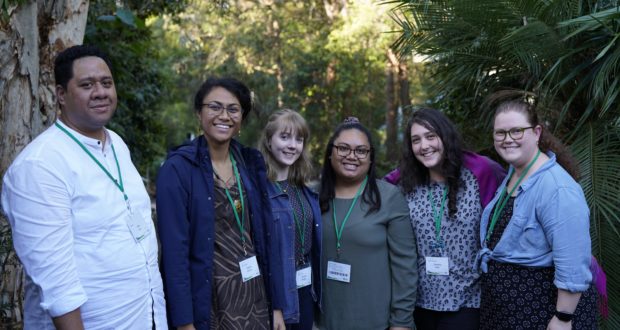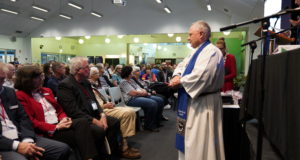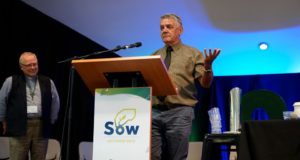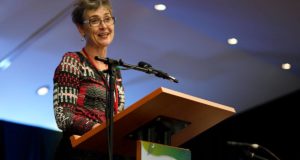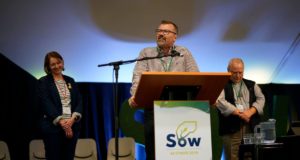The third day of Synod in Session provided an opportunity to celebrate new and past ministry, to hear about developments in mission and outreach, and to consider significant proposals before Synod. Journey reports.
The report of the Schools and Residential Colleges Commission (SRCC) by Chair Peter Campbell highlighted a number of achievements and challenges since the last Synod.
Peter drew attention to the role of the Commission at Shalom Christian College. The SRCC undertook the role as the Board of Shalom Christian College from January 2018 to February 2019, using the college constitution to lead, oversee and be accountable for the educational delivery, financial performance and both human and physical resources on the site.
Synod members also heard about the recently developed guiding principles.
“It is essential for any organisation and especially our organisation, to have a unifying set of words, guiding principles that express our views about our involvement in schools and residential colleges,” said Peter. “This is the go-to place or the truth place for not only the work we are doing but also the policy framework.”
The Commission report highlighted the development of a Schools Risk Framework and Risk Register by Property Trust school principals and business managers, and finalisation of the National Child Safe Framework.
Schools and Residential Colleges Commission member Noela Lister presented a Minute of Appreciation for Peter, who stepped down from his position at this Synod. Peter joined the Schools and Residential Colleges Commission at the 29th Synod in October 2011 and became Chair in May 2016.
Finance, Investment and Property Board
The report of the Finance, Investment and Property Board was presented by Chair Ralph Collins.
Highlights included the impact of the revision of the Synod-wide Treasury Policy to allow investment into more growth-oriented assets that comply with the Synod Ethical Investment Policy. The amount of $30 million was invested into three managed funds and over the long-term (seven-plus years) these investments are expected to generate higher than cash returns which will help rebuild the Synod Reserve Fund.
The Board reported on the continued rebuild of the Synod Reserve Fund, the emergency fund for the Synod.
“Following the decision by the Synod Standing Committee to exit from Shalom Christian College, the Synod Reserve Fund has been used and the rebuild strategy will take this into account,” said Ralph in the report.
The Board also reported the establishment of a scholarship fund with Deductible Gift Recipient (DGR) status, and the completion of a review of the development potential of all non-agency property across the Synod.
In relation to the future of the Alexandra Park Conference Centre site, the FIP Board recommendation to the Synod Standing Committee was to continue existing operations and enhance them as opportunities arise.
Embracing our multicultural church
Pastor Louisa Yu and Rev Esteban Lievano presented the report of the Multi-Cross Cultural Reference Group (MCCRG).
Louisa spoke about the population trends in Australia, noting that the data shows that 20 per cent of the population have been born overseas. This is reflected in the Uniting Church in Queensland by the presence of 40 culturally based congregations, eight intentional cross-cultural churches and worship in over 13 languages (not including the many languages of First Peoples).
“Cultural and linguistic diversity is a gift and not a problem to be solved,” said Louisa.
The highlights of the report included the growth of Next Gen Arise, a platform for young emerging leaders of the Synod to use their gifts, graces and leadership skills in building the church.
“The regular worship gatherings organised by the NGA team attract 150-200 people and are held in different locations each time. The gatherings are extended to young people from other denominations. It has also encouraged the young emerging leaders of the Queensland Synod to be involved in the various spaces of the wider church, such as the Synod in Session and the 15th Assembly, to equip them for leading and discipling in their local contexts through a leadership/discipleship program,” said the report.
Synod members were encouraged to embrace and participate in multicultural events and ministry.
“There is currently a misconception that event(s) labelled as ‘multicultural’ or ‘cross-cultural’ only apply to CALD communities, and not to the church as a whole. The MCCRG is and will continue to promote a holistic understanding of the entire church being inherently multicultural and that ‘multicultural’ and ‘cross-cultural’ is an invitation to everyone,” said Louisa in the report.
Chaplaincy: serving the world
The diverse ministry of chaplains in schools, hospitals, business, community organisations, emergency services, prisons, sporting and agencies was recognised by Rev Brian Hoole, Chair Synod Chaplaincy Commission in his report to Synod.
“All of these people serve the church in our community in various ways and the work they do is supported by many of you, and the flavour they bring has an influence on the church and its work in the world. These are the heroes of our work,” said Brian.
Highlights from the report include consolidation of the restructure of the Commission including the creation and implementation of the Chaplains Oversight Committee, and collaborative work between the Commission, UnitingCare Queensland and Wesley Mission Queensland for the professional development of health and aged-care chaplains.
Synod awards
The Moderator presented the 2019 Spirit of Synod Award to Rev Johnson Makoti from Atherton Uniting Church, describing his leadership as truly inspiring and “a credit to your faithfulness to your call to be a minister”.
Rev Dr Clive Ayre was honoured for his service with the Synod Ecumenical Relations Award.
Celebration of ministries
The celebration of ministries worship service marked a special moment at Synod, with newly ordained ministers, retired ministers and their partners, and the families of those who have passed away attending the afternoon service.
Newly ordained ministers presented to Synod by Rev John Ruhle (Associate General Secretary) and Rev Nigel Rogers (Trinity College) were: Rev Moira Dodsworth, Rev Peter Blake, Rev (James) Neil Storey, Rev Noah Kim, Rev Santina Waugh and Rev Iris Marais.
Retiring ministers were given a Minute of Appreciation honouring their faithful life of ministry.
The following people were honoured: Rev Alan Charles Robinson, Rev Brian Gilbert, Rev Bruce Johnson, Rev David Mackay-Rankin, Rev Euan McDonald, Rev Dr Jennifer Mary Tymms, Rev Col Shenfield, Rev Denis Harth, Rev Glenn Mulcahy, Rev Iris Reedman, Rev Robert Michael Miles, Rev Lynette Falkenhagen and Rev Ian Proctor.
Memorial Minutes were read honouring the life and witness of ministers who have passed away since the last Synod.
The following people were honoured: Rev Graham Dudley Hall, Rev James Francis McConaghy, Rev John Edward Gillanders, Rev Graham John Desmond Wessel, Rev Jovilisi Nataro Ragata, Rev Owen Marks, Rev Alan George Anderson, Rev Bruce Alexander Ross, Rev Douglas James Brandon, Rev Dr Bruce Warwick Upham, Rev Dr Lewis Arnold Born, Rev Dr Norma Spear, Rev Sidney James (Jim) Hamer Tame, Rev Leslie John Tilse and Rev Silas Wolmby.
Voluntary assisted dying proposal
The following report and recommendations were passed by Synod in Session:
That the Synod:
a) Receives the final report: Voluntary Assisted Dying Queensland Synod 2019.
b) Affirms the following position:
The Uniting Church in Australia—Queensland Synod seeks to witness to the God given dignity and worth of every human life. We are committed to ‘All that Jesus began to do and teach’ (Acts 1.1) by working towards a society characterised by love, compassion, justice, inclusion and reconciliation so that all people, at every stage of life, can experience ‘life in all its fullness’ (John 10:10). We seek to witness to God’s good gift of creation and the intrinsic worth and dignity of all people in every circumstance that is grounded in a reality that is untouched by the circumstances of our lives or death. In our compassionate care we seek to remain with people, in both lament and hope, bearing witness to God being with us in every circumstance of life.
In recognition of this, we do not support the legalisation of voluntary assisted dying in Queensland. If legalised, our facilities will not provide this as a service and our staff, in the course of their employment, will not participate in medical acts to end a life through voluntary assisted dying.
We recognise that in some situations, the experiences of end-of-life can cause significant distress for the person dying, their families and care staff. While we do not support voluntary assisted dying, if it is legalised, the church is committed to offering a compassionate and pastoral response to people and families who choose this path.
We also recognise that there will be people, who in good conscience and in light of their faith in God, make a decision to undertake voluntary assisted dying.
A compassionate and pastoral response in the Synod agencies includes working with people and families who choose and access voluntary assisted dying to offer emotional, psychological and social support, spiritual and pastoral care, and minimising physical suffering. This response does not include medically participating in acts intended to end life through a voluntary assisted dying process.
c) That in the case of the legalisation of voluntary assisted dying in Queensland, to request Wesley Mission Queensland and UnitingCare to develop a policy and practice approach in light of the Synod’s position and any legislative requirements.
d) Affirms the critical importance of high quality, well-resourced and accessible palliative and end-of-life care that responds to the physical, psycho-social and spiritual needs of people at the end-of-life. The church undertakes the following actions:
I. Advocate for a well-resourced and flexible system that consistently meets people’s needs and preferences for care;
II. Continue to provide high quality and accessible palliative care, responsive to the pastoral and spiritual needs of the people we serve, as central to our mission as the church.
e) That in advocating to government regarding the church’s position, the church strongly recommends provisions for conscientious objection, for both individuals and organisations, be included in any proposed legislation.
f) Encourage congregations to engage in conversations around end-of-life and to encourage members to consider completing Advance Health Directive.
g) Thank the consultation group for their work.
 JourneyOnline
JourneyOnline
